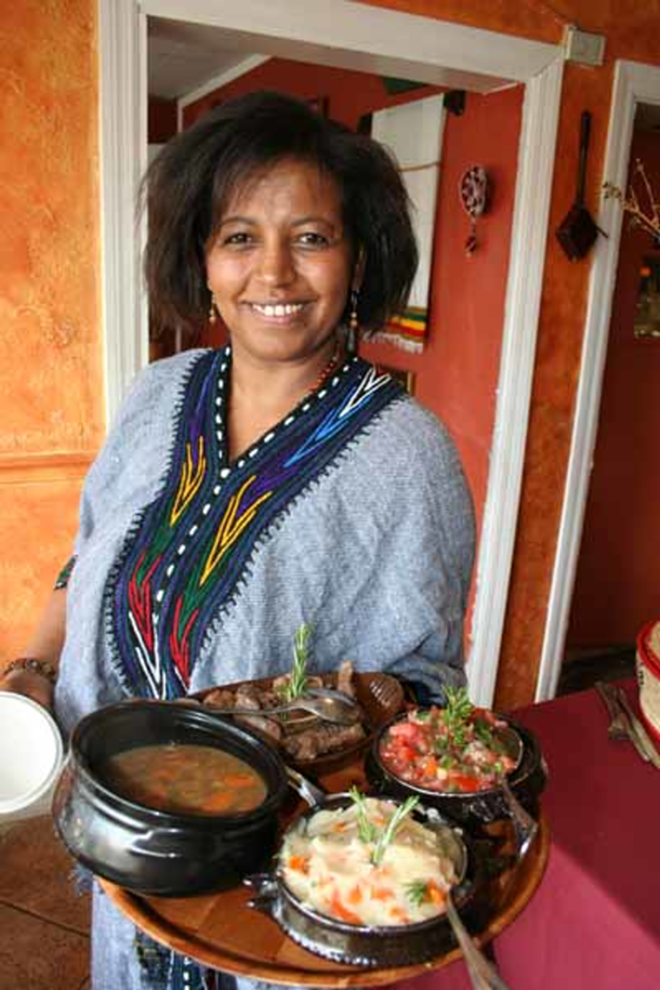As we walk toward the checkout counter in Publix with what will be $17.29 in groceries, I hit Seble Gizaw with a bit of information that makes her take pause.
"I'm not real big on lamb," I say, glad that she's using beef in the meal she's about to prepare at her restaurant, Queen of Sheba, the only Ethiopian eatery in the Bay area.
Uh oh, miscommunication. Seble has two lamb chops in her basket. She said lamb tibs (an Ethiopian dish); I heard beef tips. What now? Walk back to the meat department and trade out for beef? It's her call.
"I've never had anyone disappointed in my lamb," she says after a pause, and flashes one of her irresistible smiles. The challenge has fundamentally changed: Making a three-course dinner for two with $20 in groceries is a snap for Seble. She can easily do a meal for five. Getting Snider to like lamb? Another story altogether.
We arrive back at Queen of Sheba at about 3 in the afternoon. No customers, but the place is a hive of activity. Servers and kitchen help bustle around. Conversation fills the rooms — in English and Amharic, the common language of Ethiopia. Seble, clad in a flowing cotton tunic with colorful African accents, starts cleaning and chopping carrots, onions, garlic, tomatoes and jalapeno peppers. "We don't use bell peppers in Ethiopia," Seble says, part of a running narrative she serves up while effortlessly overseeing her kitchen. She says that there is no such thing as mass-produced vegetables in her native country; everything is organic. "It's not a choice, it's a lifestyle," she says.
Snider don't cook — at all — so watching a chef multi-task a three-course meal is like seeing someone do a bit of nuclear fusion in the kitchen sink. Seble is not making something from the Queen of Sheba menu; instead, she's more or less trying to Ethiopianize an American meal (or maybe it's the other way around): Tomato salad, lentil soup, lamb tips with mashed potato salad. An authentic Ethiopian meal would require injera, a spongy flatbread made from teff flour. People tear off pieces of injera and use it to scoop up the tasty stews common to Ethiopian cuisine — the bread, in effect, replaces eating utensils.
Today, we will be using forks and knives.
Seble Gizaw, 42, came to the U.S. 17 years ago. It was always her late father's dream that his children be educated in the States. She started at the University of Alabama Huntsville, and eventually transferred to the University of the District of Columbia, where she earned a degree in business management.
Opening a restaurant was never part of her plan, even though her family owned one in Kaffa, a province in southwestern Ethiopia, the birthplace of coffee. That's where she learned how to cook.
In 2000, while working as a server at the Portofino Bay Hotel in Orlando, she was diagnosed with an aneurism and rushed into emergency surgery. Three days later, Seble says, she was absolutely fine. "I'm an American survivor," she says. "I am very indebted to God."
The lentils are boiling in a pot, the veggies sautéing in a pan. In order to make an Ethiopian-American (or vice versa) meal, Seble has to dig into her stash of spices imported from her homeland. No substitute will do. Her not-so-secret weapon — the pungent fragrance pervades the kitchen — is cororema (in the cardamom family). Can't get the stuff around here. She keeps it in a small, unlabeled jar.
Seble reaches for the lamb and starts chopping it into sections. I'm starting to worry: How am I going to tell this lovely woman that I don't like her lamb?
When Seble was in the hospital after her surgery, a male friend came to visit her. He brought along another guy, an Ethiopian named Getachew Negash. He and Seble were married within months. They now have two daughters, 3-and-a-half and 2 years old.
Seble took two years off from work after her first child was born, and then couldn't find another job, so she figured it was time to evacuate Orlando. She'd been attending the Ethiopian Orthodox church in Riverview for several years. The choices boiled down to Kaffa or Tampa.
With restaurateuring in her blood and no other jobs immediately available, she hit upon the idea of opening a place of her own. She knew that Ibex, Tampa's only Ethiopian restaurant, had closed a few years earlier, so figured there might be a niche. Seble found her location, most recently a short-lived, upscale Italian restaurant, on a website last October. She opened in January. Queen of Sheba is not yet turning a profit, Seble says, but she's paying her bills on time and employing quite a few people. She's encouraged by how quickly a regular clientele has materialized. "Everybody who comes in the restaurant, they say the place is nice, they like the food, they're happy I'm in south Tampa, that they will bring more friends and family," she says. "I'm seeing that."
Seble pan-fries the lamb with onion and garlic and, of course, her special spices. She barely looks at it while it sizzles. She opens a package of rosemary — her one extravagance ($2.49) at Publix — and tosses it into the pan. She pulls out a dish of mashed potatoes (the only thing prepared in advance), kneads vegetables into it, then caps it off with generous twists of lemon and lime. She tastes the lentil soup and nods. Examines the lamb tips. They're ready. The whole process has taken about an hour.
I head to a table near the window and within minutes she emerges with her creation. As promised, the meal could feed an entire family. I start with tomato salad, tart and tangy. Yum. I take a few spoonfuls of the lentil soup. Seble takes no offense when I add a shake of salt. Yum. The cold mashed potato salad is tart from the lemon with just the right measure of spicy heat. Yum.
Now the lamb. I spot Seble out of the corner of my eye, a bit of an anxious look on her face. I cut a small piece and fork it into my mouth. Chew it slowly. Tender. That vaguely gamey taste that I dislike about lamb is not there. The spices enhance but don't overpower. I like this lamb. I eat another bite, then another, then a few more. Yum. No lie.
Queen of Sheba, 3636 Henderson Blvd., Tampa. 813-872-6000.
















